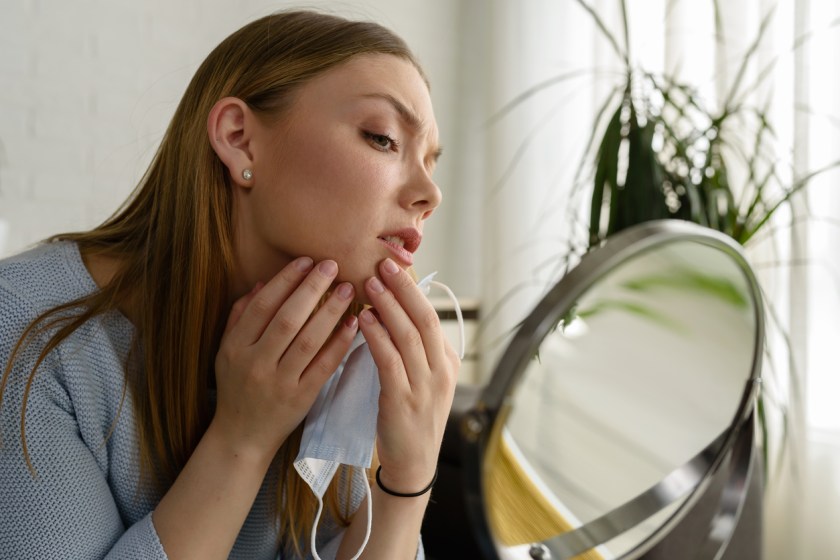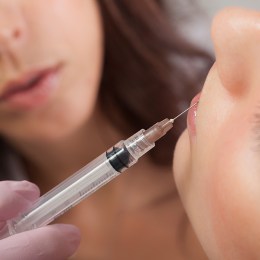Another week of lockdown, and yet another thing causing clients to stress.
The pandemic has bought so many unexpected challenges to our lives. Beyond the devastating business struggles, the skin related side effect that has gotten the most attention is ‘maskne’. I’m sure you know what we’re talking about; those inflamed spots and stubborn congestion that came as a result of wearing face masks.
It was a major client concern as it emerged last year and with the return of face coverings to much of New South Wales and Victoria recently, cases are again on the rise. So, we tapped two leading skin experts for advice to help you pass on support to your clients.
‘Maskne’ is back with a vengeance
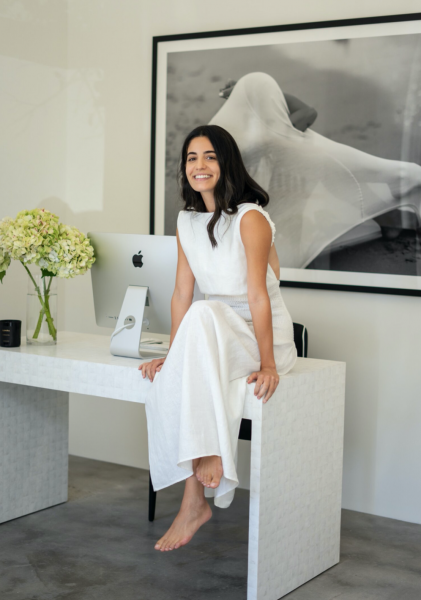
Diandra Politano, founder of her namesake clinic in Sydney’s Balmain, says ‘maskne’ is more prevalent than ever.
“It has affected every client I have consulted with, even myself personally. A lot of clients also feel it has worsened recently,” she shares.
“Unlike the previous lockdown, we are now required to wear masks more often, even outside and when walking. It is fantastic and necessary that we are being more careful. But, this is possibly the reason mask related acne is affecting more people this time around.”
“Sadly, during a lockdown there is also a lot of stress and anxiety. Yes, the external cause is from the mask, but often internal triggers can exacerbate the condition. When diagnosing someone with mask related acne you must always look at every contributing factor.”
Jacqueline Brennan, another Sydney-based skin specialist, is also experiencing an increase in enquiries about mask-related skin concerns. Breaking down the cause of ‘maskne’, she advises, “wearing the face protection mask does create a micro-climate, which can lead to bacterial infections and break outs due to dehydration, humidity, the oil produced on your skin.
“Also, compounded by the fact that you’re wearing makeup under there will increase the chances of a breakout. Not to mention the friction responsible for acne mechanica is also the culprit behind most irritation caused by protective face masks, those who are naturally prone to acne are much more likely to suffer from ‘maskne’.”
Preventing a ‘maskne’ breakout
Whoever said prevention is better than a cure deserves big props. Good practices around mask wearing make up a good portion of the advice you should be sharing with clients. For Jacqueline, this starts before your clients even put their mask on.

“I would recommend making sure the skin is cleansed, toned, and moisturised properly before applying your mask. Also, consider the type of mask – something breathable like 100% cotton and wash it regularly! Use gentle, hydrating products, and avoid anything too active,” shares Jacqueline.
Diandra agrees prevention is important and a swift course of action after mask wearing can really help clients tackle their concerns. She advises her clients: “Just because the skin didn’t break out the day before, presume that eventually it might. Get a gentle toner with a low dose of AHA, BHA or PHA. As soon as you arrive back home thoroughly tone over the entire area when you remove your mask. This will hopefully prevent you ever having an issue. Everyone needs to remember their routine is important, even though you are not wearing makeup or spending the day at home, it is important everyone sticks to their routine to avoid breakouts.”
As for mask hygiene, “Always ensure your clients are changing their disposable mask or washing fabric masks every day. Think of your mask like your underwear. So many people have a laugh when I say that – and they can never use them two days in a row again!”
Treating acne from home
While many of us share the first instinct to book an appointment with a professional at the site of a breakout, lockdowns are preventing so many from getting in clinic making home care an essential defence against ‘maskne’.
Diandra shares there are a few key questions she’s asking her clients to help formulate an appropriate strategy for treatment.
“Determine change, or if they are ‘overdoing it’. I always like to find out if they have purchased acne products online and they are using them too often. They may even be using their regular exfoliator or their active ingredients more often than usual.
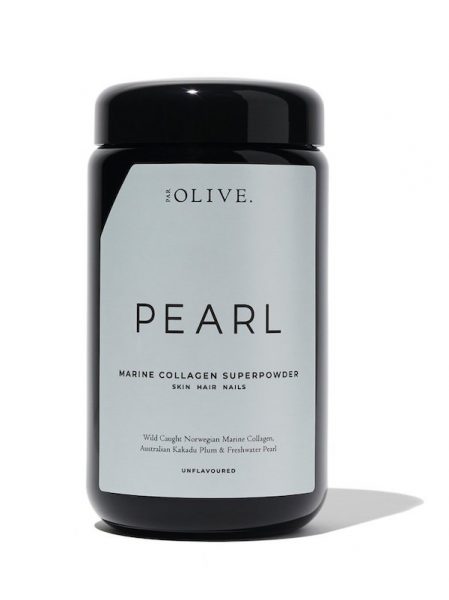
“It is important we repair the breakouts and not strip them back. A healthy strong barrier means acne will heal faster. Whether skin is breaking out due to masks, or even if someone is prone to acne – it is important to explain to clients that an exfoliating agent will not make them go away faster by using them more often than recommended.
“Healing the skin is more important than exfoliating it.”
Next up, “Introduce a new product or two, if they have not changed anything in their regime. They might need to introduce an AHA or BHA once a week with a gentle clay mask. Often introducing good quality active ingredients can dramatically clear the skin. And importantly, educate ‘hands off’. Always remind clients that picking when it’s not ready is the worst thing you could possibly do to acne. Recommend a spot treatment or pimple patches.
“Finally, factor in internal considerations. Educate clients that often internal imbalances can be worsening the condition. Eliminating dairy, processed foods and sugar can often work wonders. A magnesium supplement can help with stress related acne while zinc helps to heal the skin and calm inflammation. Collagen supplements can also help clear skin and speed up the recovery of breakouts.”
The tools for the job
In addition to offering sound skincare advice to her clients, Jacqueline has also seen great results in her clients with the use of at home tools.
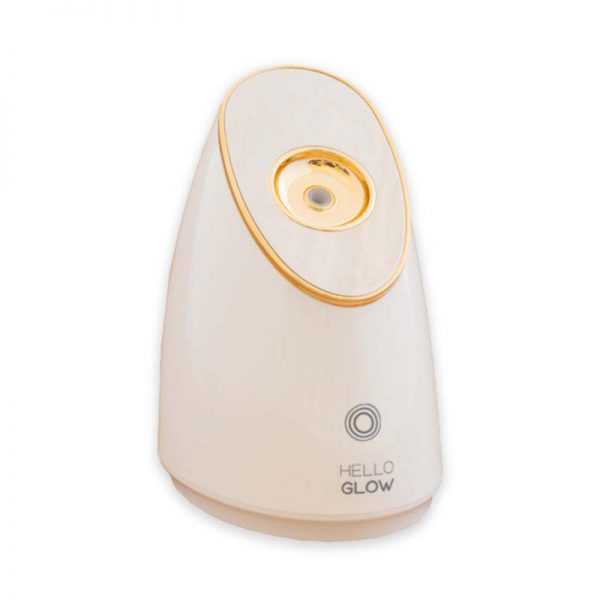
“One of my favourite at home devices to enhance results and help treat acne is our at home steamer. It warms up and opens the pores to thoroughly remove make-up, excess oil and other daily dirt and impurities, while simultaneously enhancing the efficacy of products you apply afterwards. A hugely popular device during lockdown has also been our at home Sonic Cleanse King Brush. This helps rid the skin of any residue and pollutants and only takes 2-3 mins. Not to mention how relaxing it is!”
According to Jacqueline, these tools are best combined with “a gentle, yet deeply purifying regime that combines effective cleansing with exfoliation using skin-friendly acids such as Salicylic acid, Glycolic acid or if you’re sensitive Lactic acid. This will help to prevent breakouts and deliver clear, calm skin. Also, avoid over exfoliating and moisturise! By moisturising, clients are hydrating the skin surface to re-balance oil glands and help control acne and will also improve healing.”
Some final tips
As a final line of defence, Jacqueline recommends to urge clients to be diligent in caring for their skin, rather than simply treating their acne.
“Don’t ever skip your night time routine. A full night time skincare routine allows the skin to be much stronger to deal with any friction, dehydration or humidity due to the face mask,” she says.
And as for Diandra’s final words of advice, “Never make clients feel as though their skin is bad – don’t scare them or overwhelm them. Remind your clients we can make it better and to not stress about it. Stressing about acne, looking at it all the time and picking it only makes it worse. Clear skin takes time,” she shares.
“Remind clients to be kind to themselves and love their skin.”
DID YOU KNOW
There are 5 ways you can catch up with SPA+CLINIC?
- Our quarterly print magazine, delivered to your door. Subscribe here.
- Our website, which is updated daily with its own completely unique content and breaking news.
- Our weekly newsletter – free to your inbox! Subscribe here.
- Our digital magazine – click here to view previous issues.
- Our social media – see daily updates on our Instagram, Facebook & Linkedin


